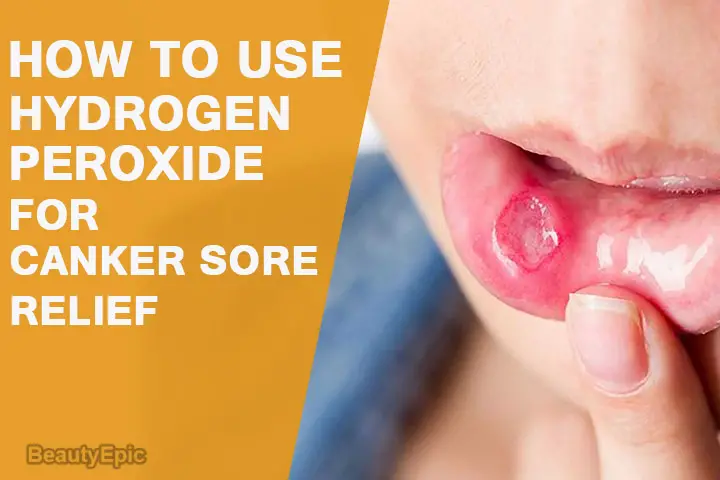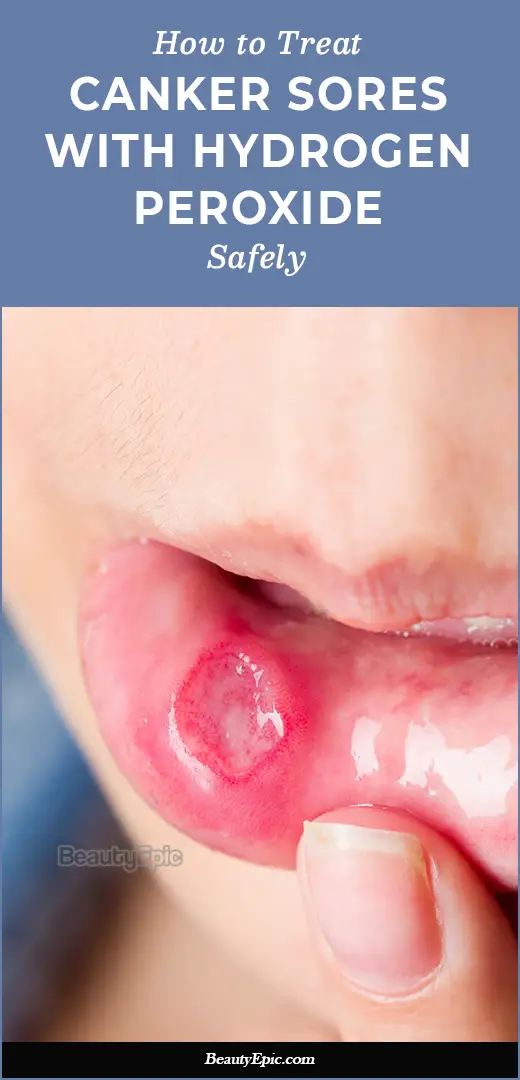
Important: This article is for informational purposes only. Please read our full disclaimer for more details.
Canker sores are nothing but mouth ulcers. They appear on the inside of the mouth either on the lips or throat, inside of cheeks or under the tongue. Biting the inside of lips or cheeks, rubbing of braces, hurting oneself with a fork, eating acidic or spicy food can cause canker sores along with stress and genetic factors. They can be highly painful and should be treated early. Some of the other factors that are responsible for the occurrence of canker sores include deficiency of folic acid, vitamin B12, zinc, iron, etc. Let us read to know how to use hydrogen peroxide for canker sores relief.(1)
Does Hydrogen Peroxide Help Canker Sores
You would notice that products such as bleach, ripening agent, topical anti-infective, etc., contain Hydrogen peroxide (H2O2) which is an oxidizing agent. It can help in reducing bacterial activities when used in a diluted form.
- Hydrogen peroxide is both antibacterial and antiseptic. As a result it is able to kill the bacteria in and around the mouth, healing canker sores.
- It relieves the pain of canker sores.
- In order to prevent canker sores and to maintain a healthy bacteria level, hence can use hydrogen peroxide as a mouth wash. This is should be used on a regular basis.(2)
How to Use Hydrogen Peroxide for Canker Sores
Mouth cankers are not very uncommon but they are very painful. Hydrogen peroxide is a useful, quick, natural and safe remedy against mouth cankers. It is also easily available and does not leave side effects.
1. Hydrogen Peroxide and Water for Canker Sores

This is an easily done remedy, which needs to be used regularly for quick results. It may however leave a strange taste in the mouth.
You’ll need:
- hydrogen peroxide
- water
- bowl
Preparation time: 2 minutes.
How to do:
- In a bowl, add hydrogen peroxide and water in equal measures.
- Mix it thoroughly and use it as a mouthwash by swishing for 1-2 minutes after which you can spit it out.
- Alternatively, you can also dip a cotton ball in the solution and place it on the sore.
- Never swallow the solution.
- Avoid eating or drinking anything for at least an hour.
Repetitions: Doing this on a regular basis will prevent the occurrence of canker sores in future.(3)
[ Read: How to Use Coconut Oil for Canker Sores ]
2. Baking Soda and Hydrogen Peroxide for Canker Sores

Both salt and baking soda are common household items. As a result this is the most easy to make home remedy.
You’ll Need:
- hydrogen peroxide
- baking soda
- salt
Preparation time: 3 minutes.
How to do:
- Take equal measures of baking soda, hydrogen peroxide and salt.
- Use it to wash your mouth couple of times during the day.
- Regular use of this method will prevent any future sores.
Repetitions: Daily.
How it works: The alkaline affect of both salt and baking soda helps to fight canker sores along with hydrogen peroxide.
3. Hydrogen Peroxide and Milk of Magnesia for Canker Sores
Milk of magnesia is mainly used as a laxative and as an antacid. However using it in small diluted proportions, along with hydrogen peroxide, helps to cure canker sores.
You’ll need:
- hydrogen peroxide
- water
- cotton ball
- milk of magnesia
- liquid benadryl
Preparation time: 5 minutes.
How to do:
- The first step in this method is to wash your mouth thoroughly with saltwater or any mouthwash.
- Now take hydrogen peroxide and water in 1:1 ratio.
- Soak a cotton ball in it and place it on the canker sore.
- Leave it as is for few minutes. Now apply a little bit of milk of magnesia on it.
- Take equal quantities of milk of magnesia and liquid Benadryl and mix them.
- Wash your mouth with it.
Note: Do not swallow it.
Repetitions: You will have to do this couple of times during the day.(4)
4. Put Hydrogen Peroxide on Canker Sore
If you do not have the time to mix hydrogen peroxide with other substances or are too lazy to do so, you can simply use it directly in the manner suggested below.
You’ll need:
- cotton ball
- hydrogen peroxide
Preparation time: 1 minute.
How to apply:
- Just soak a cotton ball in hydrogen peroxide and place it on the canker sore.
- Another method would be to take a capful of hydrogen peroxide, swish it couple of times,
- Wait for 10-15 minutes and then rinse off your mouth.
Repetitions: Doing this once in a day for 3-4 days should suffice.(5)
[ Read: How to Apply Salt to a Canker Sore ]
5. Gargle with Hydrogen Peroxide and Zinc Lozenges
You’ll need:
- hydrogen peroxide
- water
- 1-2 zinc lozenges
Preparation time: 4 minutes.
How to do:
- Add hydrogen peroxide and water in a bowl.
- Take 1-2 zinc lozenges and add it in the bowl.
- Once the lozenges have dissolved, use the solution to gargle your mouth.
Repetitions: You can try this method until you see positive results.(6)
Note: Do not swallow the solution.
How it works: Zinc helps to fight infections easily. When we mix it with hydrogen peroxide, it helps to reduce canker sores easily.
Tips and Precautions:
- The home remedies previously identified helps to fight canker sores easily. However it is important to remember that hydrogen peroxide needs to be used cautiously. Hence it is preferable to take certain precaution while using it.
- Do not swallow hydrogen peroxide as it will cause an upset stomach.
- Do not overuse the product as it tends to kill the good bacteria and result in various dental problems.
Eating a balanced diet can also aid in decrease the canker sores. This is possible because of all the proteins, vitamins and minerals present in your food.
You Might Also Like:
- 10 Best Essential Oils for Canker Sores: Benefits and Uses
- How to Get Rid of Sulfur Burps Naturally
- How to Get Rid of Roof of Mouth Sores
- How to Use Turmeric to Reduce Inflammation?
- 5 Simple Ways to Get Rid of Roof of Mouth Sore at Home
- 8 Easy Exеrсіѕеѕ tо Strengthen Your Cоrе
- 6 Best Exercises to Prevent Varicose Veins
Image:- 1
















